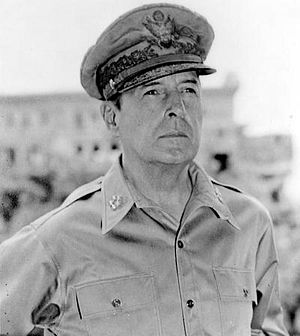This article is part of mini-series focused on key historical counterfactuals in the Asia-Pacific. See the first post here: “What if the Kuomintang Had Won the Chinese Civil War?”
As the magnitude of the Chinese counter-offensive of November 1950 became clear, U.S. commanders, in particular General Douglas MacArthur, sought the authority to conduct attacks against People’s Liberation Army (PLA) staging areas in Manchuria. MacArthur believed that air and sea attacks could help stall the momentum of the Chinese assault, hopefully saving the U.S. position in Korea. Although MacArthur never formally requested the authority to use nuclear weapons, many in the government (including President Truman) believed that he wanted such authority. Meanwhile, the U.S. Air Force (USAF) began transferring nuclear components to Guam, in contingency preparation for a potential nuclear assault.
U.S. President Harry Truman refused MacArthur’s request to expand the war into Manchuria, eventually firing the General and turning command over to Matthew Ridgway, who stabilized the situation in Korea. However, the possible use of atomic weapons in 1950 and 1951 remains one of the great unanswered “what if?” questions associated with the early Cold War. Such a decision would have affected not only the course of the Korean War, but also the broader ideological and military struggle between the United States and the Soviet Union.
So, what if the United State had used atomic weapons against China and North Korea in 1950?
Effect on the War
It’s best to understand the immediate impact of the atomic bomb in context of the use of airpower in the Korean War. Atomic weapons might have had a surprisingly small effect on the war itself. Notwithstanding the success of the MiG-15 against U.S. bomber formations, the United States largely controlled the sky over the Korean Peninsula, with B-29s delivering devastating airstrikes at the time and place of their choosing. The atomic bombs on 1950 did not yet have the power of the thermonuclear weapons developed later in the decade. When employed for tactical purposes, these bombs would have amounted to not much more than very large explosives. Employed against dispersed Chinese and North Korean forces, the limited number of bombs available to the U.S. Air Force (which had to conserve many weapons for use against the Soviets) might have had only a limited effect on the ability of China to mobilize forces and move them to the front. Moreover, the relatively primitive nature of infrastructure in North Korea and Manchuria would have worked against the effectiveness of the bombs on staging and logistics centers.
What about juicier targets, such as Beijing or Shanghai? In 1950, the USAF remained committed to the idea that wars could be won through the destruction of civilian industry and infrastructure, and that such targets could be most readily found in cities. The USAF would soon demonstrate this conviction by leveling Pyongyang in a long series of conventional raids. Even this might not have had a decisive effect on the war. At the first sign of nuclear escalation, the elite of the CCP would have dispersed from the capital and the major cities. The propaganda value of the abject annihilation of hundreds of thousands of Chinese civilians probably would have outweighed any military advantage gained by the United States.
Effect on the Future
Scholars have long debated the existence of the “nuclear taboo.” Do states refrain from using nukes because of impracticality, or do they view nuclear weapons as fundamentally immoral? The Korean War provided an important test case, because the United States had nukes, while North Korea and China did not. Moreover, few American policymakers believed that the Soviets would use any of their few primitive devices on behalf of Pyongyang or Beijing. The United States did not shy away from using strategic weapons (B-29s) for tactical purpose against North Korea; what message would the use of the Bomb have sent?
We know that Truman worried about the optics of using the weapon against two (or possibly three, depending on targeting decisions) different Asian countries. We also know that U.S. allies in Europe were very nervous about the prospect of having to politically defend the use of atomic weapons against China. While it’s possible to list these reservations under either “morality” or “practicality,” it’s also quite likely that using atomic weapons against China would have lowered the psychological and bureaucratic thresholds for using them in future conflicts against non-nuclear powers.
Cooler Heads Prevailed
It’s hard to figure out how the liberal use of atomic bombs against China and North Korea, in 1950, could have led to a good outcome. It may not have sufficed to win the war, and it may have made a victory too costly in the long run. The world is quite fortunate that cooler heads prevailed in the United States, and that the Bomb remained on the runway in the first post-World War II conflict.
































